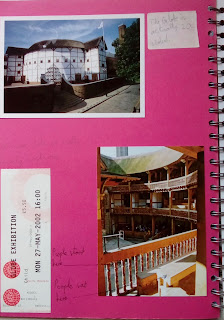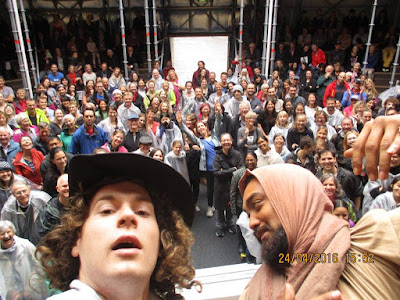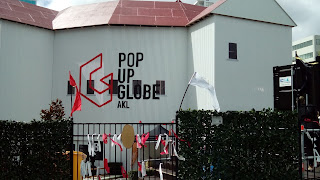Since NZ is half a day ahead of England, over there it is still April 23rd, so what better excuse to begin today with some of my favourite Shakespearean speeches (as promised in
yesterday's post).
So, without more ado, here we go (in no particular order):
Make me a willow cabin at your gate,
And call upon my soul within the house;
Write loyal cantons of contemnéd love,
And sing them loud even in the dead of night;
Hallow your name to the reverberate hills,
And make the babbling gossip of the air
Cry out 'Olivia!' O you should not rest
Between the elements of air and earth
But you should pity me!
Twelfth Night I.5.223-32
Now cracks a noble heart. Good night, sweet prince,
And flights of angels sing thee to thy rest.
Hamlet V.2.352-3
ORSINO: And what's her history?
VIOLA: A blank, my lord. She never told her love,
But let concealment like a worm i'th'bud
Feed on her damask cheek. She pined in thought,
And with a green and yellow melancholy
She sat like Patience on a monument,
Smiling at grief. Was not this love indeed?
We men may say more, swear more, but indeed
Our shows are more than will: for still we prove
Much in our vows, but little in our love.
Twelfth Night II.4.105-14
What is he whose grief
Bears such an emphasis, whose phrase of sorrow
Conjures the wand'ring stars and makes them stand
Like wonder-wounded hearers? This is I,
Hamlet the Dane.
Hamlet V.1.238-42
His legs bestrid the ocean; his reared arm
Crested the world; his voice was propertied
As all the tunéd spheres, and that to friends;
But when he meant to quail and shake the orb,
He was as rattling thunder. For his bounty,
There was no winter in't; an autumn 'twas
That grew the more by reaping. His delights
Were dolphin-like; they showed his back above
The element they lived in. In his livery
Walked crowns and crownets; realms and islands were
As plates dropped from his pocket.
Antony and Cleopatra V.2.81-91
Come, Antony, and young Octavius, come,
Revenge yourselves alone on Cassius,
For Cassius is a-weary of the world:
Hated by one he loves, brav'd by his brother,
Check'd like a bondman, all his faults observ'd,
Set in a notebook, learn'd, and conn'd by rote,
To cast into my teeth. O, I could weep
My spirit from mine eyes! There is my dagger
And here my naked breast; within, a heart
Dearer than Pluto's mine, richer than gold.
If that thou beest a Roman take it forth,
I that denied thee gold will give my heart:
Strike as thou didst at Caesar. For I know
When thou didst hate him worst thou loved'st him better
Then ever thou lov'd'st Cassius.
Julius Caesar IV.3.93-107
Fight, gentlemen of England! Fight, bold yeomen!
Draw, archers, draw your arrows to the head!
Spur your proud horses hard, and ride in blood!
Amaze the welkin with your broken staves!
Richard III V.4.339-42
Ye elves of hills, brooks, standing lakes, and groves,
And ye that on the sands with printless foot
Do chase the ebbing Neptune, and do fly him
When he comes back; you demi-puppets that
By moonshine do the green sour ringlets make,
Whereof the ewe not bites; and you whose pastime
Is to make midnight mushrooms, that rejoice
To hear the solemn curfew, by whose aid -
Weak masters though ye be - I have bedimm'd
The noontide sun, call'd forth the mutinous winds,
And 'twixt the green sea and the azur'd vault
Set roaring war; to the dread rattling thunder
Have I given fire, and rifted Jove's sout oak
With his own bolt; the strong-bas'd promontory
Have I made shake, and by the spurts pluck'd up
The pine and cedar. Graves at my command
Have wak'd their sleepers, op'd, and let 'em forth
By my so potent art. But this rough magic
I here abjure; and when I have requir'd
Some heavenly music - which even now I do -
To work mine end upon their sense that
This airy charm is for, I'll break my staff,
Bury it certain fathoms in the earth,
And deeper than did ever plummet sound
I'll drown my book.
The Tempest V.1 33-57
Not a whit. We defy augury. There is special providence in the fall of a sparrow. If it be now, 'tis not to come; if it be not to come, it will be now; if it be not now, yet it will come. The readiness is all.
Hamlet V.2.204-7





























